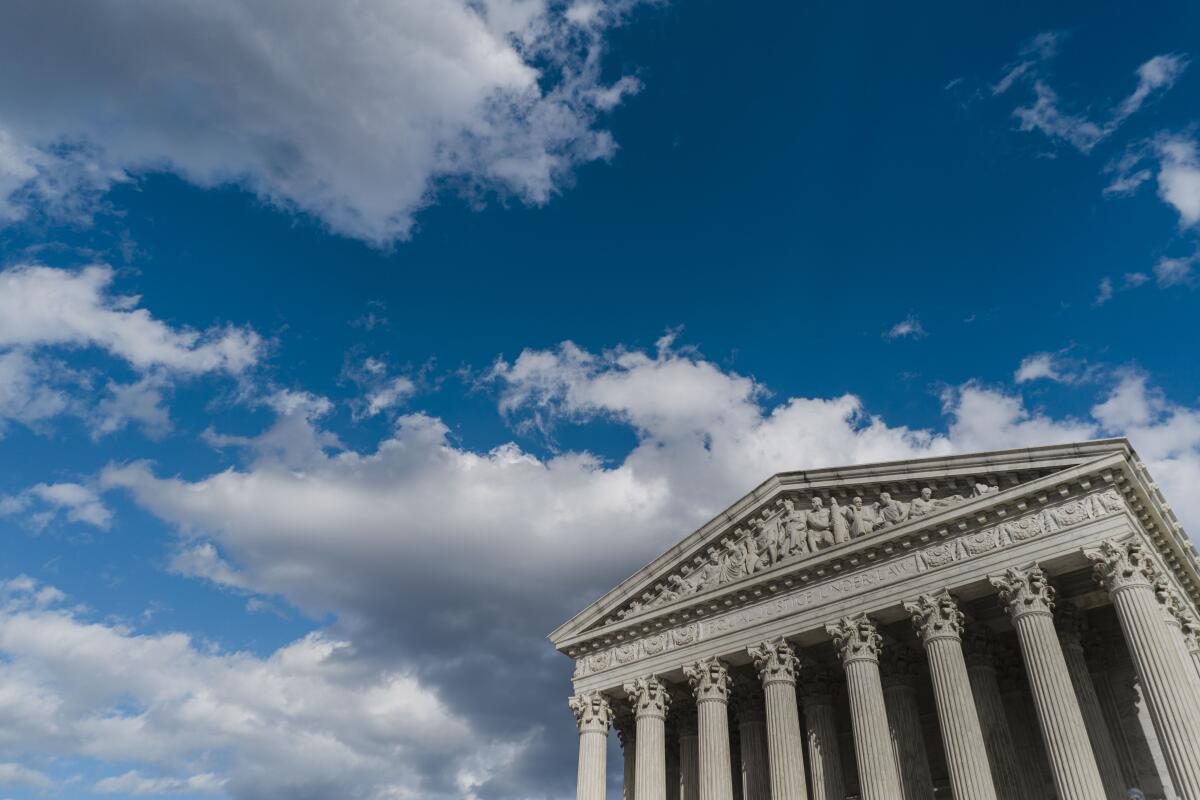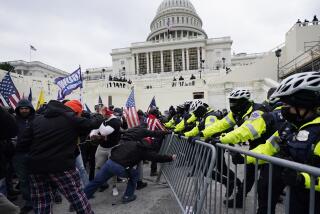Supreme Court to decide if government can prosecute someone for ‘encouraging’ illegal immigration

- Share via
WASHINGTON — Is it a crime or free speech for someone to “encourage” immigrants to come to this country illegally, or remain here after their visas have expired?
The Supreme Court grappled with that question Monday in a clash between immigration law and the 1st Amendment.
It arose in the case of Sacramento man who charged immigrants $500 to $10,000 and falsely promised he could help them obtain U.S. citizenship. More than 470 immigrants paid for the bad advice from Helaman Hansen, and he was convicted of 15 counts of fraud as well as two counts of encouraging two immigrants to overstay their visas.
That latter charge won him a partial acquittal before the U.S. 9th Circuit Court of Appeals and sent his case to the high court.
Since 1952, federal law has made it a crime to “encourage or induce an alien to come to, enter, or reside in the United States, knowing or in reckless disregard of the fact” that doing so would be illegal.
Pointing to those broad words, the 9th Circuit ruled that the provision violated the 1st Amendment because it could be read to make it a crime for family members or friends to encourage a person to come to this country or to remain here illegally.
“We apply the overbreadth doctrine so that legitimate speech relating to immigration law shall not be chilled and foreclosed,” the San Francisco-based appeals court said. The 15 fraud counts against the defendant were upheld along with a 20-year prison term.
The justices agreed to hear the government’s defense of the “encourage” provision of the law, and most of them sounded skeptical of the free-speech claim, at least in this case.
Justice Neil M. Gorsuch said it was odd to argue that Hansen’s right to free speech was violated.
“I don’t think anybody could say he’s been chilled from speaking. He’s had no problem soliciting people here in this country and defrauding them to the tune of lots and lots of money,” Gorsuch said, adding “this law has been on the books for 50 years.”
Justice Amy Coney Barrett agreed, noting there is no record of the law being used to prosecute otherwise innocent people for encouraging immigrants to stay in this country.
“The statute’s been on the books for a long time. There’s an absence of prosecutions. There is also an absence of demonstrated chilling effect,” she said.
But the court’s liberals said they saw a potential free-speech problem.
“We’re criminalizing words related to immigration,” said Justice Sonia Sotomayor. “So why should we uphold a statute that criminalizes words and makes the punishment five years, which is rather significant?”
Justice Elena Kagan said the law‘s wording is so broad that it could threaten everyday conversations. What if a lawyer, doctor or neighbor advises someone they should stay in this country even if they are undocumented, she asked.
“A huge number of such communications are taking place every day, because for every person who’s in this country unlawfully, there are probably some number of people who want that person to stay, family members, you know, whatever,” she told Deputy Solicitor Gen. Brian Fletcher. “They say, ‘I really think you should stay.’ What happens?”
He replied the government has not and will not prosecute people for such family or friendly conversations. He argued the government takes a narrow view of the words “encourage or induce.”
“Everyone agrees that in criminal law, the terms ‘encourage’ and ‘induce’ are terms of art that can refer narrowly to soliciting or aiding and abetting unlawful activity,” he said. They do not extend to “abstract” or general comments about immigration, he said. In prosecutions, the government must show the defendant intended to violate the law.
If someone is prosecuted for giving friendly advice about immigration, the defendant should invoke the 1st Amendment as a defense, he said.
He urged the court not to strike down the “encourage or induce” provision based on “absurd hypotheticals” or because of the fear it could be potentially misused in future cases.
Several of the justices also noted that Hansen may be entitled to win a retrial for part of his case because the jury instructions were flawed.
The case was United States vs. Hansen, and a written opinion is expected by late June.
More to Read
Get the L.A. Times Politics newsletter
Deeply reported insights into legislation, politics and policy from Sacramento, Washington and beyond. In your inbox three times per week.
You may occasionally receive promotional content from the Los Angeles Times.











